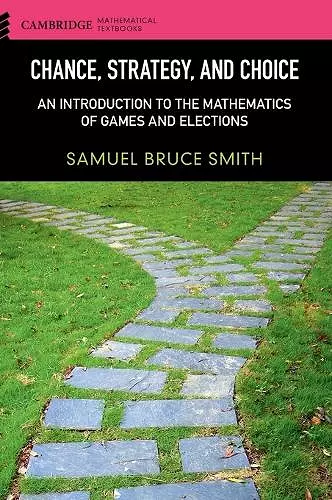Chance, Strategy, and Choice
An Introduction to the Mathematics of Games and Elections
Format:Hardback
Publisher:Cambridge University Press
Published:29th Jun '15
Currently unavailable, and unfortunately no date known when it will be back

This classroom-tested undergraduate textbook is primarily intended for a general education course in game theory at the freshman or sophomore level.
This classroom-tested undergraduate textbook is intended for a general education course in game theory at the freshman or sophomore level. While it starts off with the basics and introduces the reader to mathematical proofs, this text also presents several advanced topics, including accessible proofs of the Sprague–Grundy theorem and Arrow's impossibility theorem.Games and elections are fundamental activities in society with applications in economics, political science, and sociology. These topics offer familiar, current, and lively subjects for a course in mathematics. This classroom-tested textbook, primarily intended for a general education course in game theory at the freshman or sophomore level, provides an elementary treatment of games and elections. Starting with basics such as gambling, zero-sum and combinatorial games, Nash equilibria, social dilemmas, and fairness and impossibility theorems for elections, the text then goes further into the theory with accessible proofs of advanced topics such as the Sprague–Grundy theorem and Arrow's impossibility theorem. • Uses an integrative approach to probability, game, and social choice theory • Provides a gentle introduction to the logic of mathematical proof, thus equipping readers with the necessary tools for further mathematical studies • Contains numerous exercises and examples of varying levels of difficulty • Requires only a high school mathematical background.
'Sam Smith's book offers an intriguing juxtaposition of chance, strategy, and elections. The mathematical analysis is rigorous without being too formal or forbidding. The applications to topics in economics and political science - including auctions, power, and voting - as well as to parlor games like poker will engage both students and professionals.' Steven Brams, New York University
'I like the logical flow and length of the chapters and I like that the layout is simple (no excessively boxed theorems, etc.). There are numerous chapters, with one key concept explained in each. One could envision that each chapter would roughly be covered in a class period.' John Cullinan, Bard College, New York
'The author's approach does seem as if it would appeal to a broad range of instructors and students: there are enough chapters that an instructor could choose a collection of topics according to his or her interest. Furthermore, the inclusion of proof-based sections would allow an instructor to use the text for a course targeted at math majors and minors rather than at a general nontechnical audience.' James Parson, Hood College, Maryland
'The book is well written and interesting. Students should have little difficulty reading and understanding this book … The book covers the topics with clarity and applies game theory to 'real-world' problems.' Dan Cunningham, State University of New York, Buffalo
'While some of Smith's material has origins more than 100 years old, the author engages the reader through modern developments, such as the minimax theorem (1928), the work of John Nash and Kenneth Arrow (1950s) and even more recent developments by Steven Brams, William Zwicker and Alan Taylor (1980s–2000s). The author does an effective job of presenting this material to an audience of non-science majors with no prerequisites. A unique feature of the text is the treatment of combinatorial games such as Nim and Hackenbush alongside traditional two person game theory.' David Vella, Skidmore College, New York
'Chance, Strategy, and Choice fits an important niche for general audience textbooks about games, elections, and other introductory material related to social choice theory … One of my favorite features of the book is that it does an excellent job of integrating the topics of games and elections to illustrate the interconnections between the different areas of social choice theory, often through illustrative examples.' Adam Graham-Squire, MAA Reviews
ISBN: 9781107084520
Dimensions: 261mm x 184mm x 29mm
Weight: 1010g
352 pages